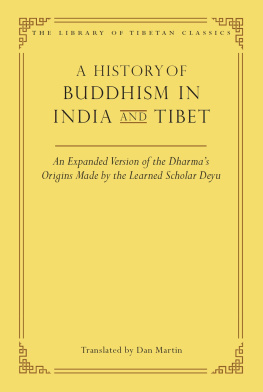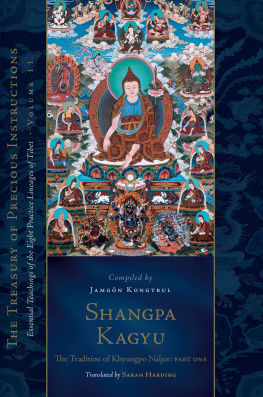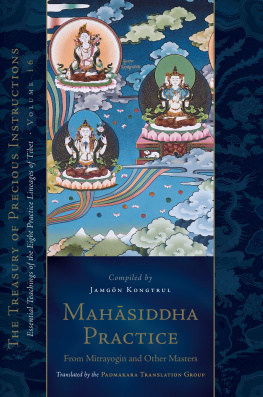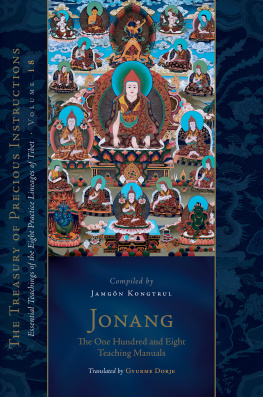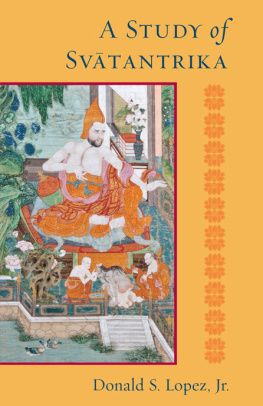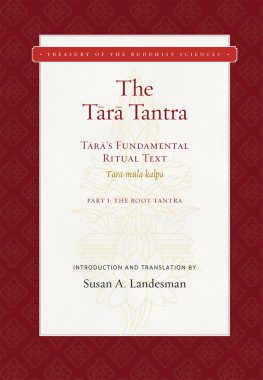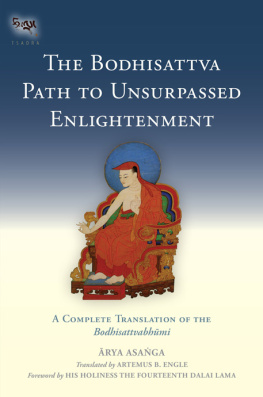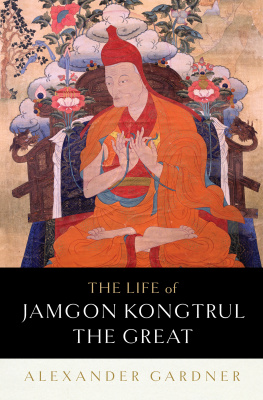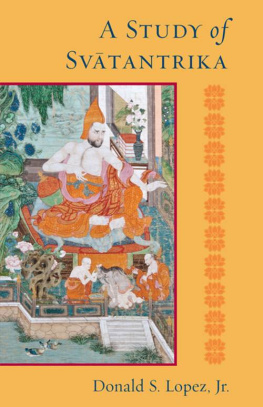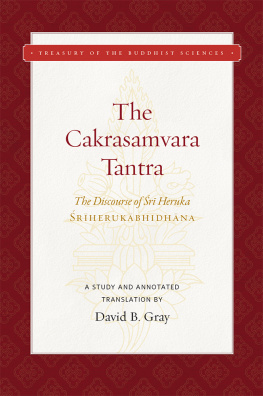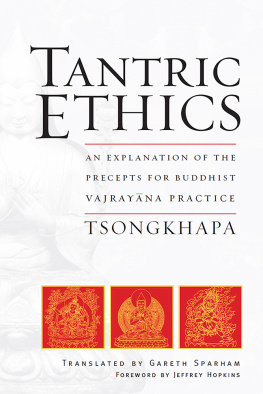The Library of Tibetan Classics is a special series developed by the Institute of Tibetan Classics aimed at making key classical Tibetan texts part of the global literary and intellectual heritage. Eventually comprising thirty-two large volumes, the collection will contain over two hundred distinct texts by more than a hundred of the best-known authors. These texts have been selected in consultation with the preeminent lineage holders of all the schools and other senior Tibetan scholars to represent the Tibetan literary tradition as a whole. The works included in the series span more than a millennium and cover the vast expanse of classical Tibetan knowledgefrom the core teachings of the specific schools to such diverse fields as ethics, philosophy, linguistics, medicine, astronomy and astrology, folklore, and historiography.
A History of Buddhism in India and Tibet
This volume contains the first full English translation of a thirteenth-century history of Buddhism in India and Tibet. That means most of all a complete life of the Buddha with the history of his renunciate order and of early Buddhist authors in India. Midway through, the action moves to Tibet where there is an emphasis on the Tibetan ruling dynasty, the translators of Buddhist texts, and the lineages that transmitted doctrinal understanding, meditative insights, and practical realization. It concludes with a pessimistic account of the demise of the monastic order followed by optimism with the advent of the future Buddha Maitreya. The composer of this remarkably ecumenical Buddhist history remains anonymous but was likely a follower of rare lineages of Dzogchen and Zhij teachings. He put together some of the most important early sources on the Tibetan imperial period that had been preserved in his times and supplies the best witnesses we have for many of them in our own times.

Wisdom Publications
199 Elm Street
Somerville, MA 02144 USA
wisdomexperience.org
2022 Institute of Tibetan Classics
All rights reserved.
No part of this book may be reproduced in any form or by any means, electronic or mechanical, including photography, recording, or by any information storage and retrieval system or technologies now known or later developed, without permission in writing from the publisher.
Library of Congress Cataloging-in-Publication Data
Names: Mkhas-pa-ldeu, active 12th century, author. | Martin, Dan, 1953 translator. | Institute of Tibetan Classics.
Title: A history of Buddhism in India and Tibet; translated by Dan Martin.
Other titles: Rgya Bod kyi chos byu rgyas pa. English
Description: Somerville, MA: Wisdom; Montreal: in association with the Institute of Tibetan Classics, [2022] | Series: The library of Tibetan classics ; volume 32 | Includes bibliographical references and index.
Identifiers: LCCN 2021015711 (print) | LCCN 2021015712 (ebook) | ISBN 9780861714728 (hardcover) | ISBN 9781614297420 (ebook)
Subjects: LCSH: BuddhismTibet RegionHistoryEarly works to 1800. | Tibet RegionReligionEarly works to 1800. | BuddhismIndiaHistoryEarly works to 1800.
Classification: LCC BQ7576 .M5413 2022 (print) | LCC BQ7576 (ebook) | DDC 294.3dc23
LC record available at https://lccn.loc.gov/2021015711
LC ebook record available at https://lccn.loc.gov/2021015712
ISBN 978-0-86171-472-8 ebook ISBN 978-1-61429-742-0
26 25 24 23 22
5 4 3 2 1
Cover and interior design by Gopa & Ted 2.
Message from the Dalai Lama
THE LAST TWO MILLENNIA witnessed a tremendous proliferation of cultural and literary development in Tibet, the Land of Snows. Moreover, due to the inestimable contributions made by Tibets early spiritual kings, numerous Tibetan translators, and many great Indian paitas over a period of so many centuries, the teachings of the Buddha and the scholastic tradition of ancient Indias Nland monastic university became firmly rooted in Tibet. As evidenced from the historical writings, this flowering of Buddhist tradition in the country brought about the fulfillment of the deep spiritual aspirations of countless sentient beings. In particular, it contributed to the inner peace and tranquility of the peoples of Tibet, Outer Mongoliaa country historically suffused with Tibetan Buddhism and its culturethe Tuva and Kalmuk regions in present-day Russia, the outer regions of mainland China, and the entire trans-Himalayan areas on the southern side, including Bhutan, Sikkim, Ladakh, Kinnaur, and Spiti. Today this tradition of Buddhism has the potential to make significant contributions to the welfare of the entire human family. I have no doubt that, when combined with the methods and insights of modern science, the Tibetan Buddhist cultural heritage and knowledge will help foster a more enlightened and compassionate human society, a humanity that is at peace with itself, with fellow sentient beings, and with the natural world at large.
It is for this reason I am delighted that the Institute of Tibetan Classics in Montreal, Canada, is compiling a thirty-two-volume series containing the works of many great Tibetan teachers, philosophers, scholars, and practitioners representing all major Tibetan schools and traditions. These important writings will be critically edited and annotated and will then be published in modern book format in a reference collection called The Library of Tibetan Classics, with their translations into other major languages to follow later. While expressing my heartfelt commendation for this noble project, I pray and hope that The Library of Tibetan Classics will not only make these important Tibetan treatises accessible to scholars of Tibetan studies but will create a new opportunity for younger Tibetans to study and take interest in their own rich and profound culture. Through translations into other languages, it is my sincere hope that millions of fellow citizens of the wider human family will also be able to share in the joy of engaging with Tibets classical literary heritage, textual riches that have been such a great source of joy and inspiration to me personally for so long.

The Dalai Lama
The Buddhist monk Tenzin Gyatso
Special Acknowledgments
THE INSTITUTE OF TIBETAN CLASSICS expresses its deep gratitude to the Ing Foundation for its generous support of the entire cost of translating this important volume. The Ing Foundations long-standing patronage of the Institute of Tibetan Classics has enabled the institute to support the translation of multiple volumes from The Library of Tibetan Classics . We are deeply grateful to the foundation for offering us the opportunity to share many of the important texts of the Tibetan tradition with wider international readership, making these works truly part of the global literary, knowledge, and spiritual heritage.
Publishers Acknowledgment
THE PUBLISHER WISHES TO extend a heartfelt thanks to the following people who have contributed substantially to the publication of The Library of Tibetan Classics :
Pat Gruber and the Patricia and Peter Gruber Foundation
The Hershey Family Foundation
The Ing Foundation
We also extend deep appreciation to our other subscribing benefactors:
Anonymous, dedicated to Buddhas within
Anonymous, in honor of Dzongsar Khyentse Rinpoche
Anonymous, in honor of Geshe Tenzin Dorje
Anonymous, in memory of K. J. Manel De Silvamay she realize the truth
Dr. Patrick Bangert
Nilda Venegas Bernal

